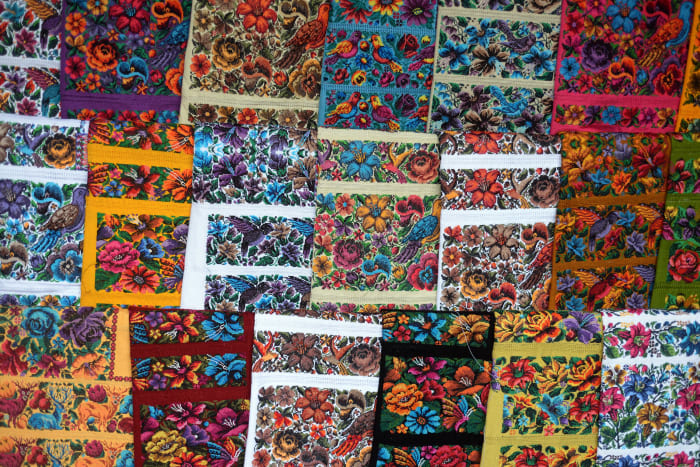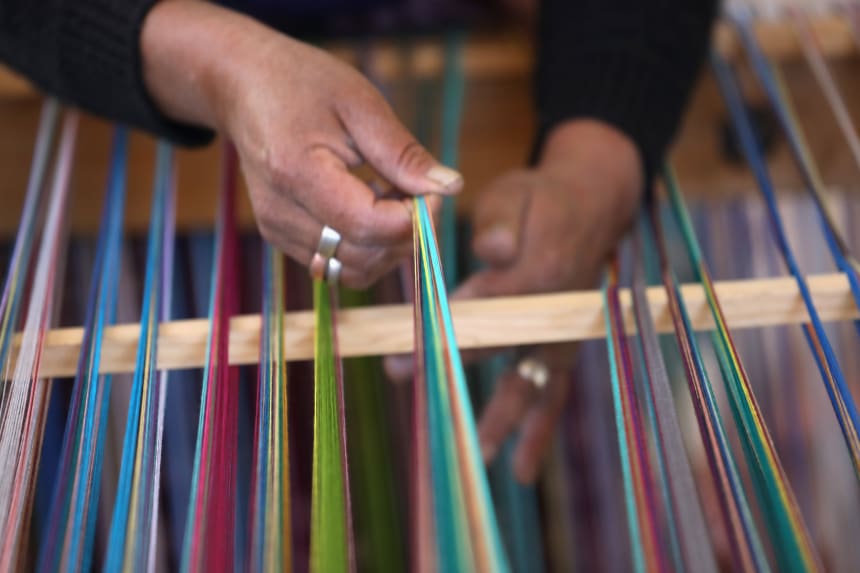Imitation isn’t always a form of flattery. Certainly not for the Indigenous Guatemalan artisans who hand-make designs that date back generations, weaving history into the threads of blouses, scarves and more — only to have them be ripped off on the runway or on fast-fashion clothing racks, without due credit.
Many of the adornments on these traditional textiles contain sacred symbology, only meant to be worn by certain people deemed worthy of bearing said symbols during special ceremonies. Some designs carry deep cultural significance, and certain patterns used to this day are meant to represent indigenous folklore as well as the flora, fauna and landscapes of Guatemala — like the quetzal, the national bird, or geometric patterns of waves and volcanoes rendered in tuk (purple), raxabaj (green) and q’ij (yellow).
Purchasing items that don’t fairly credit and compensate the artisans they originate from threatens not only their livelihood, but also their cultural integrity, through appropriation and erasure. Organizations like the Consejo de Tejedoras, a weaving cooperative in Santo Domingo Xenacoj (a town about an hour outside of Guatemala City), are working to prevent this.

Huipiles on display at a market in Sumpango, Guatemala in 2013.
Photo: Getty Images/JOHAN ORDONEZ/AFP
Led by Kʼiche’ weaver Doña Gloria Estella, the Consejo de Tejedoras is fighting to reclaim ancient motifs that have been used without permission or compensation. Doña Estella refers to the misuse of these sacred designs — like when a New York-based handbag brand allegedly used artwork from Consejo de Tejedoras’s handwoven huipiles — as “copy and paste.” She refers to her textiles as a history book: “Everything is there — math, psychology, spirituality.” To have the designs lifted, then, is an attack on the community.
Doña Estella and artisans from over 30 organizations met in Guatemala City in November 2016 at the First Assembly of Weavers, organized by the Women’s Association for Development of Sacatepequez, to tackle the ongoing issue of copycats. They came together with a manifesto that reads: “Our fabrics are the result of communal creations and therefore no company and individual can claim responsibility for our textiles without falling into plagiarism or theft.” Beyond advocacy, the weavers demanded legislation to protect their work. (Earlier that year, a group presented a bill to Guatemala’s Constitutional Court to protect their intellectual property.)
Related Stories:
Guatemalan Artisans Are Going After 64,000+ Etsy Products for Copyright Infringement
Lauren Conrad’s The Little Market Store Is Basically Her Instagram Feed Come to Life
It’s Time to Rethink the ‘Trend’ of Burning Sage on Instagram
The most meaningful way to support artisans is to buy from them, directly: If you’re interested in pieces from Guatemala, you can visit their weaving cooperatives, or you can find their wares through e-commerce sites like Meso Goods, The Little Market and Mercado Global, which partner with different artists to sell their pieces globally. (The Consejo de Tejedoras sells a few pieces online through responsible tour operator Guate4You.) The latter represent a growing series of social enterprises aimed at exporting local designs while putting resources back into the communities they work with.
Meso Goods was founded in 2010 by Diego Olivero to break cycles of poverty in Guatemala through traditional design practices. “I was born in Guatemala and have always been amazed by our craftsmanship,” he says. “Guatemala has almost one million artisans working in different techniques. We saw this as an opportunity to create access to international markets.”
Nowadays, Meso Goods works with more than 550 Guatemalan artisans across specialties, from pedal loom and backstrap loom to beading, metalwork and woodwork. It also has a partnership with Guatemala’s Exporters Association to sell pillows, rugs, throws and more pieces made ethically with local materials. “By establishing long-term relationships with artisans and connecting them to international markets we empower them to forge their paths to economic mobility,” Olivero says, noting that Meso Goods pays its artisans 20% above the national minimum wage in Guatemala.
On top of his work with Meso Goods, Olivero also led the creative efforts for the nonprofit street-art initiative Pintando Santa Catarina Palopó, which in 2017 transformed exterior walls in the Guatemalan fishing town through painted murals replicating traditional motifs. That led to a collaboration with West Elm called the Atitlán Project, which celebrated Guatemalan craftsmanship and was created in collaboration with Roar + Rabbit, with the approval of community leaders. The designers visited Santa Catarina Palopó to paint one of the houses and gather inspiration for the collection, which launched in 2019 and, according to Olivero, has raised $190,000 for the community.
Other groups, like Mayan Hands and Maya Traditions Foundation, have been around for decades, forging relationships between local craftspeople and global retailers. They work with artisans to provide them sustainable income opportunities through profit-sharing and fair-trade wages while empowering them to preserve their ancestral textile traditions.
Misty López, Maya Traditions Foundation’s ethical travel sales manager, says its partnership with The Little Market, the fair-trade e-commerce site co-founded by Lauren Conrad and Hannah Skvarla, has created opportunities for its artisan partners on a global scale, which then supports “our mission of preserving backstrap weaving as an ancestral art.” Artisans who work with the Foundation receive 25 to 50% of the profits from their textile designs, she adds.
The rise of e-commerce destinations specializing in fair-trade, artisanal goods has helped get the message out on the importance of supporting the actual creators. The brand and non-profit Mercado Global partners with over 250 artisans across Guatemala on pieces sold online and at retailers like Reformation and Yoox. Beyond simply offering a platform to sell their work, it also connects artisans with each other, which can lead to valuable connections and skill-sharing.
Before working with Mercado Global, artisan Santiaga Xinico Yos says she had never gotten the chance to collaborate with other weavers. “I was really happy because it’s an opportunity to learn more techniques,” she says. Silvia Andrea Chaclan, another artisan who works with the brand, adds: “I learned how to embroider with techniques people no longer know how to do.”
Ultimately, it’s about not just giving credit where credit is due, but also helping educate a global consumer about the history and tradition behind these beautiful textiles. Says Mercado Global artisan Doña María: “I might not see who buys the products, but I’m happy because the products went to another part of the world. I feel proud.”
Want more Fashionista? Sign up for our daily newsletter and get us directly in your inbox.


